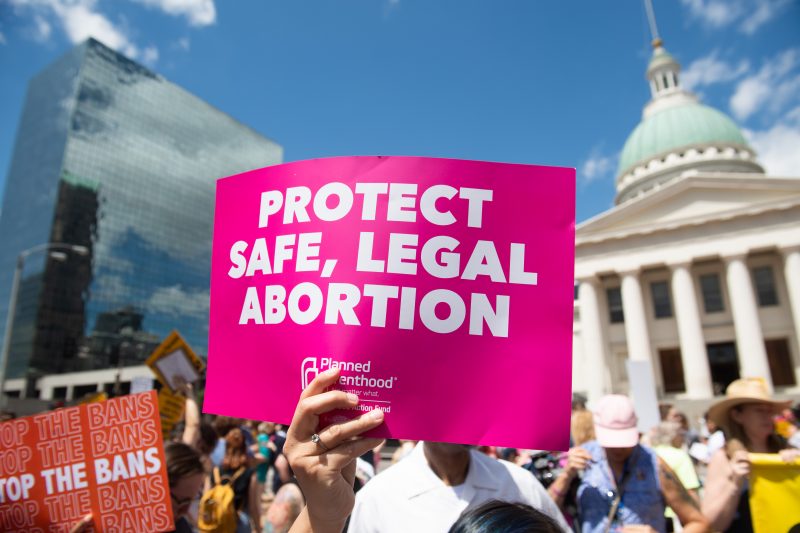Years after her abortion, Missouri woman fights to keep it legal
Pro-choice demonstrators protest outside the Old Courthouse in St Louis against a state move that would effectively close the only remaining abortion clinic in Missouri (SAUL LOEB)
St. Louis (AFP) – When she was 17 years old, Casey Godwin left her home state of Missouri to have an abortion.
Twenty-two years later, with Missouri poised to potentially close its only abortion clinic, Godwin does not want another woman to have to go through what she did.
After becoming pregnant, Godwin had to cross the Missouri River into the neighboring state of Illinois to terminate the undesired pregnancy.
Missouri state law required parental consent for her to undergo the procedure and she didn’t want to tell her very “strict” and devout Christian family.
“I was very naive. And I ended up pregnant,” Godwin said in an interview with AFP at her St Louis home. “I didn’t know I was pregnant. Everything felt normal for a long time.
“Then I went through a phase of ‘That can’t happen to me, there’s no way,'” she said. “When I finally went to Planned Parenthood and discovered I actually was pregnant, I was too scared to tell my parents.”
Thousands of women in Missouri, which has a population of six million, may be forced to go to other states to end unwanted pregnancies if the conservative midwestern state strips the licence on Friday of its only clinic providing abortions.
The facility run by Planned Parenthood in St Louis is hoping that the courts step in at the last minute to prevent its license from being revoked, which would make Missouri the only US state without an abortion clinic.
The US Supreme Court legalized abortion in 1973 but several Republican-led states have passed tough laws in recent weeks and months restricting the practice.
“I have experience of facing, you know, the reality of what could happen in the same circumstances,” said Godwin, now a 39-year-old mother of two homeschooled children. “And I don’t want that.”
“It was scary,” she said, recalling having to find someone with a car to drive her across the river to Illinois and coming up with $1,000 for the procedure.
“I had a tough, tough time with it physically,” she said. “I had to go back. I had a complication. It could have been really, really serious.”
– ‘Really drastic’ –
Godwin remains convinced she made the right decision and she joined hundreds of other pro-choice women at a protest in St Louis on Thursday seeking to keep the Planned Parenthood clinic open.
“I was at a place where I was battling an eating disorder and depression,” she said of her teenage years, and if she had been unable to secure an abortion, “I probably would have ended my life.”
“And I can just imagine now, you know, people in that position,” Godwin said. “I can resonate with that story.
“I think there will be girls who will find themselves in positions where they are not in a place where they can raise a child and take on a child.
“And they are not going to have that child,” she said. “And they might resort to really drastic things. They might do dangerous things like attempt to abort themselves.”
Missouri is one of the states that has toughened its abortion laws, prohibiting the procedure after eight weeks of pregnancy, a time when many women don’t even yet know they are pregnant.
Opponents of abortion are hoping that the new state laws will make their way to the Supreme Court and force the nation’s highest court to revisit the legality of the procedure.
Since taking office, President Donald Trump has appointed two conservative justices — Neil Gorsuch and Brett Kavanaugh — and liberal members of the court are now outnumbered five to four.
Disclaimer: Validity of the above story is for 7 Days from original date of publishing. Source: AFP.


